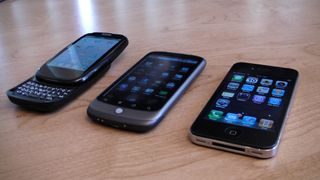How Apple stays years ahead of the competition

There's a fascinating answer up on Quora that suggests how Apple uses their massive $70 billion bank account to literally stay years ahead of the competition when it comes to manufacturing and components.
Apple actually uses its cash hoard in a very interesting way to maintain a decisive advantage over its rivals: When new component technologies (touchscreens, chips, LED displays) first come out, they are very expensive to produce, and building a factory that can produce them in mass quantities is even more expensive. Oftentimes, the upfront capital expenditure can be so huge and the margins are small enough (and shrink over time as the component is rapidly commoditized) that the companies who would build these factories cannot raise sufficient investment capital to cover the costs.
What Apple does is use its cash hoard to pay for the construction cost (or a significant fraction of it) of the factory in exchange for exclusive rights to the output production of the factory for a set period of time (maybe 6 - 36 months), and then for a discounted rate afterwards. This yields two advantages:
- Apple has access to new component technology months or years before its rivals. This allows it to release groundbreaking products that are actually impossible to duplicate. Remember how for up to a year or so after the introduction of the iPhone, none of the would-be iPhone clones could even get a capacitive touchscreen to work as well as the iPhone's? It wasn't just the software - Apple simply has access to new components earlier, before anyone else in the world can gain access to it in mass quantities to make a consumer device. One extraordinary example of this is the aluminum machining technology used to make Apple's laptops - this remains a trade secret that Apple continues to have exclusive access to and allows them to make laptops with (for now) unsurpassed strength and lightness.
- Eventually its competitors catch up in component production technology, but by then Apple has their arrangement in place whereby it can source those parts at a lower cost due to the discounted rate they have negotiated with the (now) most-experienced and skilled provider of those parts - who has probably also brought his production costs down too. This discount is also potentially subsidized by its competitors buying those same parts from that provider - the part is now commoditized so the factory is allowed to produce them for all buyers, but Apple gets special pricing.
Apple is not just crushing its rivals through superiority in design, Steve Jobs's deep experience in hardware mass production (early Apple, NeXT) has been brought to bear in creating an unrivaled exclusive supply chain of advanced technology literally years ahead of anyone else on the planet. If it feels like new Apple products appear futuristic, it is because Apple really is sending back technology from the future.
Once those technologies (or more accurately, their mass production techniques) become sufficiently commoditized, Apple is then able to compete effectively on cost and undercut rivals. It's a myth that Apple only makes premium products - it makes them all right, but that is because they are literally more advanced than anything else (i.e. the price premium is not just for design), and once the product line is no longer premium, they are produced more cheaply than competitor equivalents, yielding higher margins, more cash, which results in more ability to continue the cycle.
Steve Jobs, when he announced the original iPhone, said it was 5 years ahead of the competition. This has often been discussed in terms of software, but the above makes a compelling argument about its applicability to hardware as well (or perhaps even more so). webOS and Android can easily be seen as equal to iOS, if not better than iOS in certain areas. By contrast, few would contend that Palm/HP phones, or any Android device on the market (many of which creak like old Hasbro toys) are anywhere near the build quality of the one year old iPhone 4.
It's not even clear to me if the competition would make Apple-style investments in design, production, and components even if they could. It's a risky gamble and many seem far more content to play the low margin game, hoping to make it in the volume that sometimes comes with it.
Master your iPhone in minutes
iMore offers spot-on advice and guidance from our team of experts, with decades of Apple device experience to lean on. Learn more with iMore!
Philip Elmer-Dewitt of Fortune, crediting Asymco's Horace Dediu says:
Apple has become not a monopoly (a single seller), but a monopsony -- the one buyer that can control an entire market.
If so, it's not only by virtue of Apple being bold enough to step forward, but by everyone else hesitating or stepping back.
[Quora, The Critical Path via Fortune]

Rene Ritchie is one of the most respected Apple analysts in the business, reaching a combined audience of over 40 million readers a month. His YouTube channel, Vector, has over 90 thousand subscribers and 14 million views and his podcasts, including Debug, have been downloaded over 20 million times. He also regularly co-hosts MacBreak Weekly for the TWiT network and co-hosted CES Live! and Talk Mobile. Based in Montreal, Rene is a former director of product marketing, web developer, and graphic designer. He's authored several books and appeared on numerous television and radio segments to discuss Apple and the technology industry. When not working, he likes to cook, grapple, and spend time with his friends and family.
Most Popular




